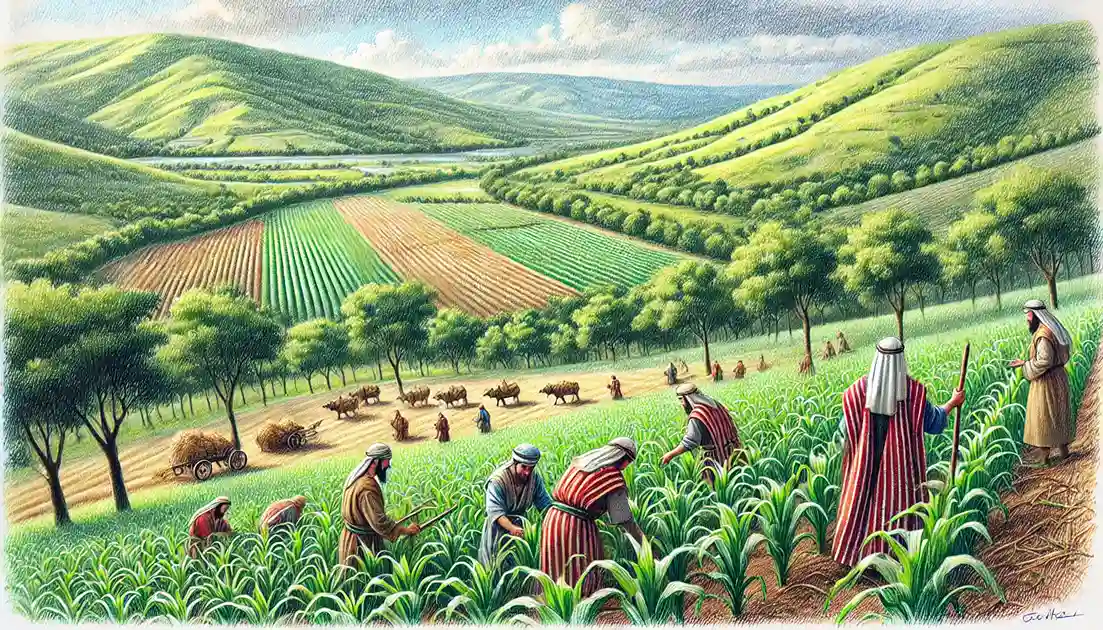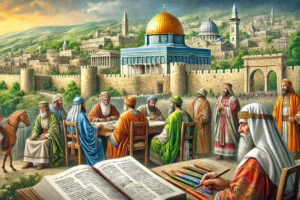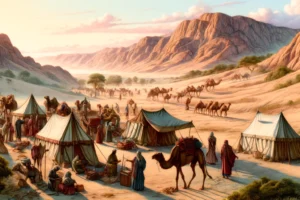
Issachar: A Tribe of Israel
Brief Introduction: Issachar, one of the twelve tribes of Israel, descends from Issachar, the fifth son of Jacob and Leah. Known for its agricultural prosperity and strategic location, the tribe played a significant role in Israel’s history.
Quick Facts:
- Name: Issachar
- Meaning: “There is recompense” or “He will bring a reward”
- Father: Jacob
- Mother: Leah
- Tribal Territory: Fertile region in the Jezreel Valley
- Notable Descendants: Tola (Judge of Israel)
- Biblical References: Genesis 30:18, Numbers 26:23-25, Judges 5:15
- Symbol: Donkey (Genesis 49:14-15)
Origins and Meaning: Issachar, one of the twelve tribes of Israel, originated from Issachar, the fifth son of Jacob and Leah. His name means “there is recompense” or “he will bring a reward” (Genesis 30:18), reflecting Leah’s gratitude for God’s favor. This name embodies the tribe’s role in Israel’s history as providers and hardworking individuals.
Territory and Agricultural Prosperity: The tribe of Issachar was allocated a fertile region in the Jezreel Valley (Joshua 19:17-23). This area, known for its rich soil and favorable climate, was ideal for agriculture. The tribe’s prosperity was largely due to this strategic location, which allowed for abundant crop production and trade opportunities. The fertile land enabled Issachar to contribute significantly to the sustenance of the Israelite nation.
Symbolism: Issachar is symbolized by a strong donkey (Genesis 49:14-15), representing both the tribe’s agricultural focus and their resilience. The donkey, known for its strength and ability to bear heavy burdens, aptly describes Issachar’s hardworking and industrious nature. This metaphor emphasizes the tribe’s role in providing for the nation and their ability to thrive under the pressures of agricultural labor.
Notable Descendants: Among Issachar’s notable descendants is Tola, who served as a judge of Israel for twenty-three years (Judges 10:1-2). Tola’s leadership brought stability and peace to Israel following Abimelech’s tumultuous rule. His tenure as judge highlights the tribe’s ability to produce capable leaders who guided and stabilized the nation during difficult times.
Military Support and Wisdom: The men of Issachar played a crucial role in supporting Deborah and Barak during their battle against the Canaanite king Jabin (Judges 5:15). This support underscores their bravery and strategic importance in military endeavors. Furthermore, 1 Chronicles 12:32 describes the men of Issachar as those who “understood the times and knew what Israel should do,” signifying their wisdom and insight. This attribute made them valuable advisors and leaders, capable of guiding the nation with discernment and understanding.
Influence and Legacy: Throughout Israel’s history, the tribe of Issachar maintained a significant influence due to their agricultural wealth and the wisdom of their leaders. Their contributions to the nation’s sustenance, military support, and governance were substantial. The tribe’s ability to combine strength, wisdom, and diligence set a lasting example for future generations.
Theological Insights: The story of Issachar offers several theological insights. It demonstrates God’s provision and reward, as seen in Leah’s naming of Issachar. The tribe’s success in agriculture reflects the biblical theme of God blessing the land and the people who work it faithfully. Additionally, Issachar’s wisdom and understanding highlight the importance of discernment and insight in leadership, aligning with the biblical principle of seeking wisdom from God.
Conclusion: The tribe of Issachar, though not as prominently featured as some other tribes, played a vital role in the history and development of Israel. Their agricultural prosperity, wisdom, and leadership left an indelible mark on the nation. Through their contributions, the tribe of Issachar exemplifies the values of hard work, wisdom, and divine reward, serving as an enduring legacy within the biblical narrative.



